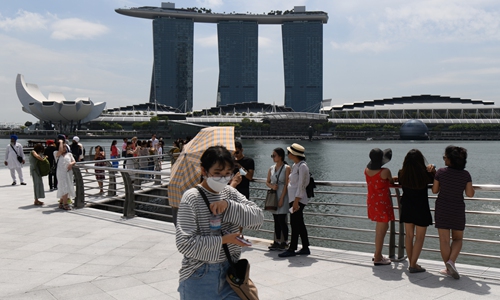HOME >> WORLD
New COVID-19 cases in Singapore sounds alarm for Chinese cities
By Deng Xiaoci, Chen Qingqing, and Zhao Juecheng Source:Globaltimes.cn Published: 2020/3/17 1:50:44

A visitor, wearing a protective facemask amid fears about the spread of the COVID-19, walks along Merlion Park in Singapore in Feb, 2020. Photo: AFP
Singapore health officials confirmed 17 new coronavirus (COVID-19) cases on Monday, and over half were from foreign locations. Observers noted that the news should sound an alarm for Chinese cities that claimed victory over the pandemic.
Of the 11 imported cases, the victims had traveled to France, Spain, and the US, according to a press release from Singapore's Ministry of Health.
The confirmed infections also marked a biggest single-day spike for the city-state, the Strait Times reported, as the total number of infected patients stands at 243.
Four patients were linked to previous cases, while two are unlinked.
On Sunday, Singapore announced new measures to reduce COVID-19 carriers from entering the city-state. Residents were advised to defer all non-essential travel abroad to reduce the risks of contracting the virus.
The Strait Times also reported that five Singaporeans tested positive for COVID-19 after attending a religious gathering at a mosque outside of Kuala Lumpur, capital of its neighboring Malaysia. The same group visited 10 mosques in Singapore last week.
Religious officials announced on Friday it would close all 70 mosques in Singapore for five days so they could be cleaned, after two people who had attended a religious gathering in Selangor, Malaysia were confirmed to have COVID-19.
It was also announced Monday the mosque closures would run through March 26 due to the recent spike in virus infections.
A French businessman, Ludovic, often travels between China and Singapore, told the Global Times that the Singapore government has done a good job with their epidemic prevention and control efforts, especially in tracking people and implementing self-isolation measures.
"My temperature is checked 10 times a day, at every building entrance," Ludovic said, noting that people who received Stay Home Notification were called to make sure they were following home quarantine orders.
Now, Singapore is experiencing a new round of COVID-19 cases, and Ludovic said the surge is likely due to people arriving from Europe or other countries in Southeast Asia where control measures were implemented later.
Singapore, as an international hub, has been under pressure to defend itself from imported cases, and the inflow of large religious followers from its close neighbors, Malaysia and Indonesia, has added to the challenge, Gu Xiaosong, an expert on Southeast Asian studies at the Guangxi Academy of Social Sciences, told the Global Times on Thursday.
A return of this nature should sound the alarm for major Chinese cities like Beijing and Shanghai, despite the victories that have been claimed nationwide, Gu noted.
The strict measures in place to prevent foreign infections from entering should continue, and especially at this point, Gu said.
Analysts warned that border closures have a limited effect. After the US announced a travel ban against Europe, travelers from the continent rushed to major airports in the US, accelerating the spread of COVID-19.
"For smaller countries, shutting down a country is a double-edged sword, as their disease prevention and medical resources are limited, and a temporary shutdown may be relatively safe, but those countries are more dependent on global sources and supply chains," Chen Xi, an assistant professor of public health at Yale University, told the Global Times on Monday.
Country shutdowns also cause significant economic losses, which might not be favorable for epidemic prevention work, Chen added.
RELATED ARTICLES:
Posted in: ASIA-PACIFIC